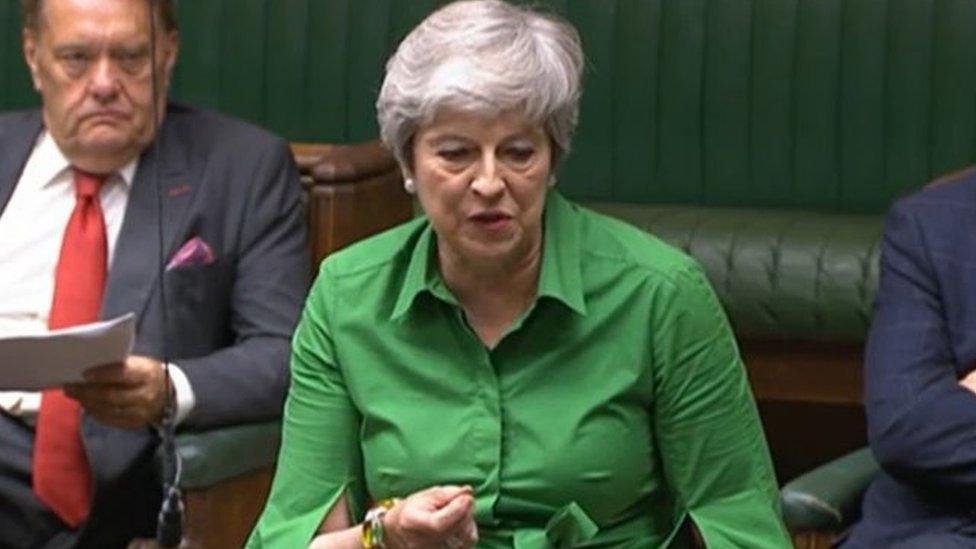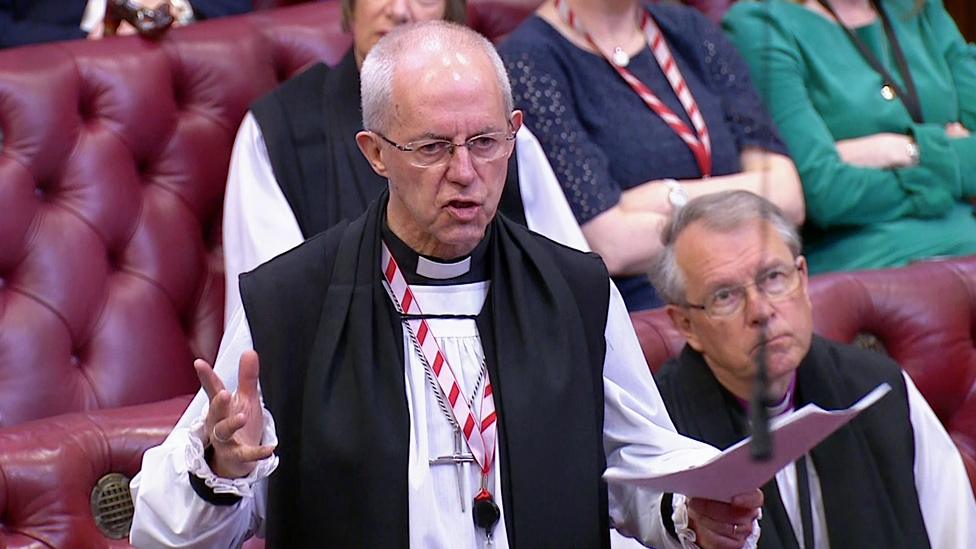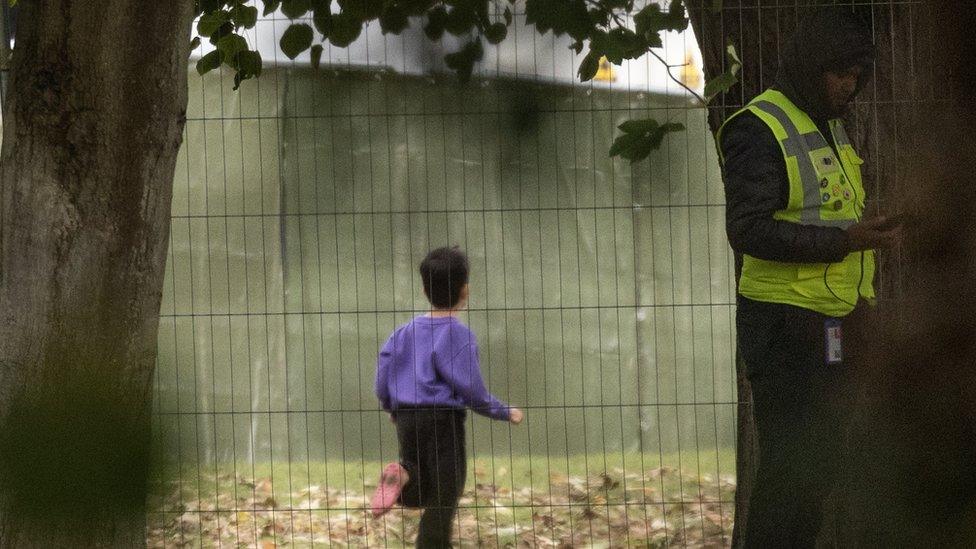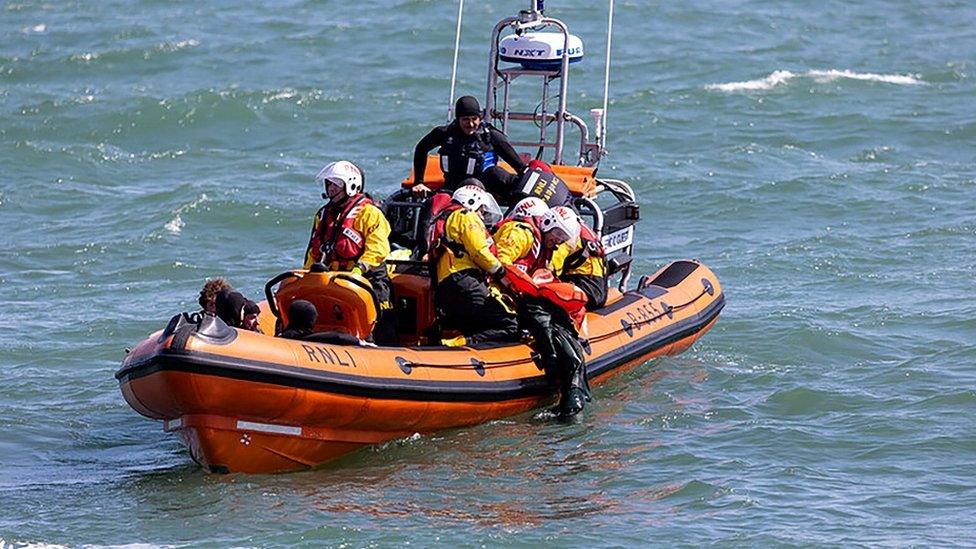Senior Tories criticise Illegal Migration Bill but MPs reject Lords changes
- Published

The former prime minister, Theresa May, argued the bill would "consign more people to slavery"
Some senior Tory MPs have criticised the government's asylum reforms as MPs overturned changes made by the House of Lords to the Illegal Migration Bill.
Former PM Theresa May was among more than a dozen Tories arguing for a different approach from ministers.
But their calls did not stop MPs voting to reject revisions peers had made to the bill in the Lords.
The bill is central to Prime Minister Rishi Sunak's pledge to stop small boats crossing the English Channel.
The Illegal Migration Bill seeks to deter people from making the crossing by toughening up the rules and conditions around seeking asylum.
As it was debated in the House of Commons on Tuesday, Mr Sunak said he was "throwing absolutely everything" at tackling Channel crossings.
But the passage of the bill has not been easy, with peers voting for 20 changes and campaigners calling on MPs to reject the government's proposals.
The amendments voted for by the Lords have been overturned by MPs in a series of 18 votes, although ahead of the debate, the Home Office offered several concessions, including on time limits for the detention of children and pregnant women.
The bill now heads to the Lords again, for peers to consider the changes made by MPs.
In a Commons debate, Immigration Minister Robert Jenrick accused peers of "wrecking" the government's asylum reforms by trying to make amendments.
Mr Jenrick said it was "vital" that the bill was passed quickly and described amendments made by the Lords as being "riddled with exceptions and get-out clauses".
The government's concessions were not enough to win the backing of some Tory MPs, who raised concerns over how the bill treats unaccompanied children and the victims of modern slavery.
Mrs May said the bill "will consign more people to slavery", adding she would have to "persist in disagreeing with the government" on this issue.
The former prime minister told MPs: "I know that ministers have said this bill will enable more perpetrators to be stopped, but on modern slavery I genuinely believe it will do the opposite.
"It will enable more slave-drivers to operate and make money out of human misery."
She was among 16 Conservatives who voted against the government's rejection of protections for people claiming to be victims of modern slavery.
There were also rebellions from Conservative MPs connected to the limits and conditions of detaining unaccompanied children.
One of the rebels, former Conservative minister Tim Loughton, said the "assurances that we were promised have not materialised or, if they have, I am afraid nobody understands them".
He complained about the timing of the concessions and said "more work needs to be done" on scrutinising the bill before it becomes law.
Robert Jenrick says cartoons in an asylum reception centre were painted over as they were not "age appropriate" for teenagers.
One of the most controversial aspects of the bill would place a legal duty on the government to detain and remove migrants arriving in the UK illegally, either to Rwanda or another "safe" third country.
Stephen Kinnock, Labour's shadow immigration minister, said the government's Rwanda plan was "fundamentally flawed", and he accused Mr Jenrick of "pettiness" for painting over Mickey Mouse cartoons in an immigration centre.
Mr Kinnock said the bill would "only make a terrible situation worse" by increasing the asylum backlog, and "ensure people smugglers are laughing all the way to the bank".
Race to recess
With Parliament due to break for summer at the end of next week, the bill faces a prolonged stand-off between peers and the government during so-called parliamentary ping-pong, when legislation is batted between the Lords and Commons until agreement on the wording can be reached.
The latest figures show more than 13,000 migrants have made the crossing so far this year, including more than 1,600 in the last four days.
The government's efforts to curb the number of small boats crossing the Channel have been hampered in Parliament and the courts.
A plan to house asylum seekers on a barge moored in Dorset has been delayed.
And the government's policy of sending migrants to Rwanda is set for a legal battle in the Supreme Court.
On Monday, a senior Home Office official confirmed the department was paying to keep nearly 5,000 beds empty across the country, in case a sudden influx of migrants caused overcrowding at detention centres.
The government has stressed it remains committed to its plan to remove migrants to Rwanda, and has said it will challenge a Court of Appeal ruling last week that this was unlawful.
Related topics
- Published5 July 2023

- Published3 July 2023

- Published29 June 2023
